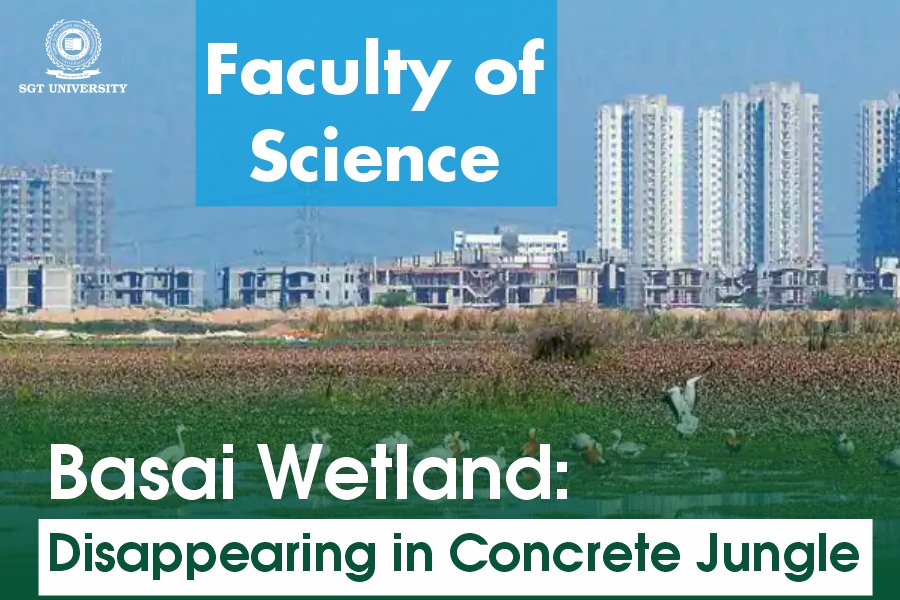A wetland is an area of land seasonally or permanently saturated with water. Wetlands are nature’s most significant and unique features, serving as a source of drinking water, erosion control, flood control, climate stabilisers, groundwater replenishment, water purification, etc.
Wetlands also provide habitat to various aquatic and terrestrial animals and plants. A similar wetland is present in the Basai village of Gurugram, 8 kilometres east of Sultanpur National Park. It is a haven for native and migratory birds and crucial for the Gurugram’s ecosystem.
Once, the Basai wetland was recognised as a critical biodiversity area by the International Union for Conservation of Nature (IUCN) because it was home to more than 20,000 birds of around 300 bird species. Many of these bird species are of threatened and endangered categories.
Until a decade ago, floating vegetation and reeds made this lush swampland home to various frogs, turtles, fish, insects, and other aquatic life.
Basai wetland is just like a second home to an astonishing variety of migratory birds that fly in from as far as Siberia and Europe. The migratory bird species include the likes of ducks, geese, songbirds, snipes, godwits, stints, plovers, harriers, eagles, and cranes.

Sultanpur National Park is also home to permanent residents like egrets, herons, kingfishers, spoonbills, etc., of Sultanpur National Park, which is also included in the Ramsar Wetlands of International Importance list in 2021.
Bombay Natural History Society (BNHS) has documented 281 species of birds in the Basai wetland and called this one of the top destinations for bird watching. The Wildlife Institute of India and BirdLife International have also recognised this as an Important Bird Area (IBA) for native and migratory birds.
Unfortunately, this wetland is dying at the cost of the human desire to expand the city, construction and infrastructure development. Tall buildings are majorly affecting the migratory routes of thousands of migratory birds.
Over the years, this shallow wetland has shrunk to just around 50 acres from 300 acres. Also, the number of bird species and population has reduced drastically, but still, they are coming in a good number.
At present, residents of this region are not much aware of the importance of this wetland. Still, in reality, this is a blessing to the area that adds to the city’s livability due to its sheer beauty and significant role in maintaining the ecosystem.
Basai wetland performs the critical service of storing and purifying water, groundwater recharge, and sequestering carbon. The city is already over-crowded, and the water demand will further rise with the construction of more apartments, affecting the water table.
These wetlands play a significant role in storing rainwater while preventing floods in the city. Wetland absorbs rainwater and recharges groundwater quickly, which helps maintain the groundwater table.
If this wetland is lost, water scarcity, a receding groundwater level, flash floods during heavy rains, and the sight of dwindling vegetation from high-rise windows will become a terrible reality. Actually, in greed, we forget to maintain environmental sustainability, which may lead to a disastrous situation in the future.
Written By:-
Dr Vikram Mor
Assistant Professor,
Department of Environmental Science,
Faculty of Science




